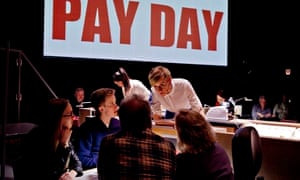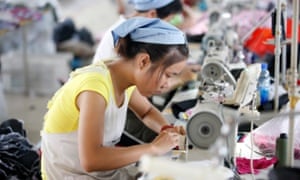
World Factory … how would you cope? Photograph: photograph by David Sandison
The choices were stark: sack a third of our workforce or cut their wages by a third. After a short board meeting we cut their wages, assured they would survive and that, with a bit of cajoling, they would return to our sweatshop in Shenzhen after their two-week break.
But that was only the start. In Zoe Svendsen’s play World Factory at the Young Vic, the audience becomes the cast. Sixteen teams sit around factory desks playing out a carefully constructed game that requires you to run a clothing factory in China. How to deal with a troublemaker? How to dupe the buyers from ethical retail brands? What to do about the ever-present problem of clients that do not pay? Because the choices are binary they are rarely palatable. But what shocked me – and has surprised the theatre – is the capacity of perfectly decent, liberal hipsters on London’s south bank to become ruthless capitalists when seated at the boardroom table.
The classic problem presented by the game is one all managers face: short-term issues, usually involving cashflow, versus the long-term challenge of nurturing your workforce and your client base. Despite the fact that a public-address system was blaring out, in English and Chinese, that “your workforce is your vital asset” our assembled young professionals repeatedly had to be cajoled not to treat them like dirt.
And because the theatre captures data on every choice by every team, for every performance, I know we were not alone. The aggregated flowchart reveals that every audience, on every night, veers towards money and away from ethics.
Svendsen says: “Most people who were given the choice to raise wages – having cut them – did not. There is a route in the decision-tree that will only get played if people pursue a particularly ethical response, but very few people end up there. What we’ve realised is that it is not just the profit motive but also prudence, the need to survive at all costs, that pushes people in the game to go down more capitalist routes.”
In short, many people have no idea what running a business actually means in the 21st century. Yes, suppliers – from East Anglia to Shanghai – will try to break your ethical codes; but most of those giant firms’ commitment to good practice, and environmental sustainability, is real. And yes, the money is all important. But real businesses will take losses, go into debt and pay workers to stay idle in order to maintain the long-term relationships vital in a globalised economy.
Why do so many decent people, when asked to pretend they’re CEOs, become tyrants from central casting? Part of the answer is: capitalism subjects us to economic rationality. It forces us to see ourselves as cashflow generators, profit centres or interest-bearing assets. But that idea is always in conflict with something else: the non-economic priorities of human beings, and the need to sustain the environment. Though World Factory, as a play, is designed to show us the parallels between 19th-century Manchester and 21st-century China, it subtly illustrates what has changed.
The choices were stark: sack a third of our workforce or cut their wages by a third. After a short board meeting we cut their wages, assured they would survive and that, with a bit of cajoling, they would return to our sweatshop in Shenzhen after their two-week break.
But that was only the start. In Zoe Svendsen’s play World Factory at the Young Vic, the audience becomes the cast. Sixteen teams sit around factory desks playing out a carefully constructed game that requires you to run a clothing factory in China. How to deal with a troublemaker? How to dupe the buyers from ethical retail brands? What to do about the ever-present problem of clients that do not pay? Because the choices are binary they are rarely palatable. But what shocked me – and has surprised the theatre – is the capacity of perfectly decent, liberal hipsters on London’s south bank to become ruthless capitalists when seated at the boardroom table.
The classic problem presented by the game is one all managers face: short-term issues, usually involving cashflow, versus the long-term challenge of nurturing your workforce and your client base. Despite the fact that a public-address system was blaring out, in English and Chinese, that “your workforce is your vital asset” our assembled young professionals repeatedly had to be cajoled not to treat them like dirt.
And because the theatre captures data on every choice by every team, for every performance, I know we were not alone. The aggregated flowchart reveals that every audience, on every night, veers towards money and away from ethics.
Svendsen says: “Most people who were given the choice to raise wages – having cut them – did not. There is a route in the decision-tree that will only get played if people pursue a particularly ethical response, but very few people end up there. What we’ve realised is that it is not just the profit motive but also prudence, the need to survive at all costs, that pushes people in the game to go down more capitalist routes.”
In short, many people have no idea what running a business actually means in the 21st century. Yes, suppliers – from East Anglia to Shanghai – will try to break your ethical codes; but most of those giant firms’ commitment to good practice, and environmental sustainability, is real. And yes, the money is all important. But real businesses will take losses, go into debt and pay workers to stay idle in order to maintain the long-term relationships vital in a globalised economy.
Why do so many decent people, when asked to pretend they’re CEOs, become tyrants from central casting? Part of the answer is: capitalism subjects us to economic rationality. It forces us to see ourselves as cashflow generators, profit centres or interest-bearing assets. But that idea is always in conflict with something else: the non-economic priorities of human beings, and the need to sustain the environment. Though World Factory, as a play, is designed to show us the parallels between 19th-century Manchester and 21st-century China, it subtly illustrates what has changed.

A worker in a Chinese clothing factory Photograph: Imaginechina/Corbis
A real Chinese sweatshop owner is playing a losing game against something much more sophisticated than the computer at the Young Vic: an intelligent machine made up of the smartphones of millions of migrant workers on their lunchbreak, plugging digitally into their village networks to find out wages and conditions elsewhere. That sweatshop owner is also playing against clients with an army of compliance officers, themselves routinely harassed by NGOs with secret cameras.
The whole purpose of this system of regulation – from above and below – is to prevent individual capitalists making short-term decisions that destroy the human and natural resources it needs to function. Capitalism is not just the selfish decisions of millions of people. It is those decisions sifted first through the all-important filter of regulation. It is, as late 20th-century social theorists understood, a mode of regulation, not just of production.
Yet it plays on us a cruel ideological trick. It looks like a spontaneous organism, to which government and regulation (and the desire of Chinese migrants to visit their families once a year) are mere irritants. In reality it needs the state to create and re-create it every day.
Banks create money because the state awards them the right to. Why does the state ram-raid the homes of small-time drug dealers, yet call in the CEOs of the banks whose employees commit multimillion-pound frauds for a stern ticking off over a tray of Waitrose sandwiches? Answer: because a company has limited liability status, created by parliament in 1855 after a political struggle.
Our fascination with market forces blinds us to the fact that capitalism – as a state of being – is a set of conditions created and maintained by states. Today it is beset by strategic problems: debt- ridden, with sub-par growth and low productivity, it cannot unleash the true potential of the info-tech revolution because it cannot imagine what to do with the millions who would lose their jobs.
The computer that runs the data system in Svendsen’s play could easily run a robotic clothes factory. That’s the paradox. But to make a third industrial revolution happen needs something no individual factory boss can execute: the re-regulation of capitalism into something better. Maybe the next theatre game about work and exploitation should model the decisions of governments, lobbyists and judges, not the hapless managers.
The computer that runs the data system in Svendsen’s play could easily run a robotic clothes factory. That’s the paradox. But to make a third industrial revolution happen needs something no individual factory boss can execute: the re-regulation of capitalism into something better. Maybe the next theatre game about work and exploitation should model the decisions of governments, lobbyists and judges, not the hapless managers.
No comments:
Post a Comment